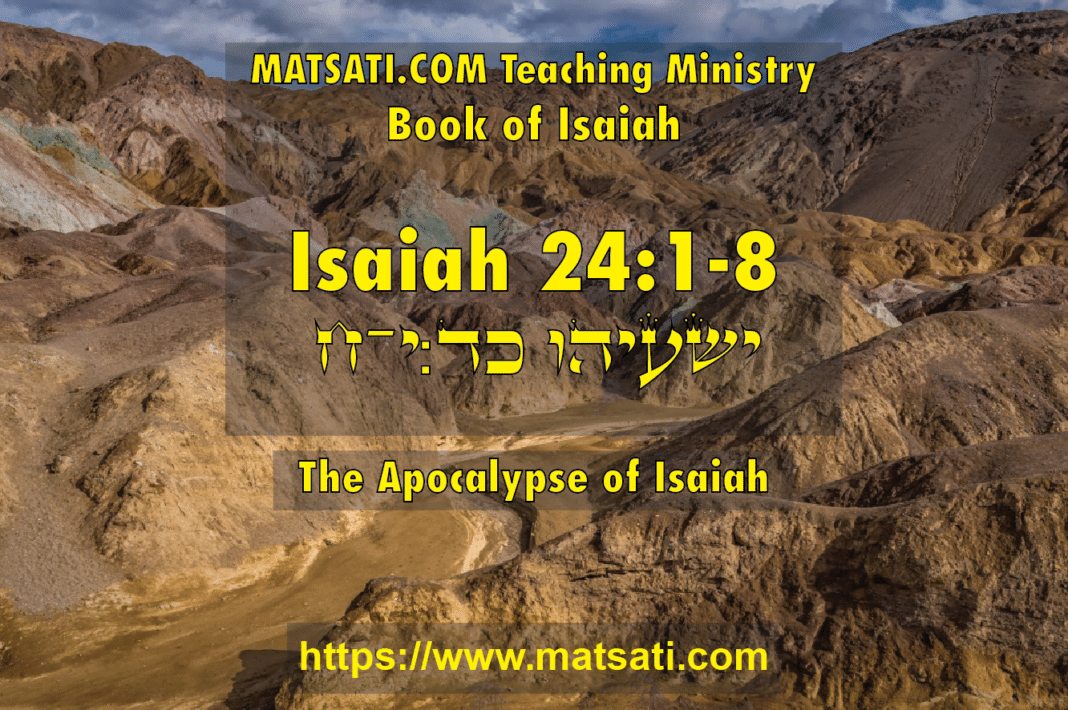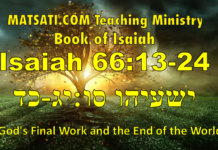Isaiah 24:1-8
Isaiah 24 is the first of four chapters that are called the Apocalypse of Isaiah, because he speaks of a worldwide dominion of God. The point of these four chapters as compared to Isaiah 13-23, is that he gives a more generalized and broader prophecy of destruction. He declares the Lordship of God over all the world, and these chapters should be taken into the context of Isaiah 13-23. John Oswalt comments saying that in the research literature, the date and authorship of these chapters attributed by authors is broad, going from Isaiah himself to some Deutero-Isaiah in the early second century. The reason there is a divergence in dates and opinions is due to there being a complete lack of datable historical data in these chapters. John Oswaly says, “Part of this divergence is due to the complete lack of datable historical allusions in the segment. Numerous attempts have been made to identify the overthrown city, reaching from Nineveh in 609 to Babylon at various times to Samaria in 107 B.C.,22 but none of these has gained currency, and most contemporary writers agree that no specific city was intended but that the “city” symbolized the world. Ultimately, it is the theology, especially the references to resurrection (Isaiah 25:8 and 26:19), that have caused many to opt for a date later than the seventh century. However, the attempt to date materials on the basis of theology is extremely tenuous and often betrays a distinctly circular flavor. Linguistic studies have likewise yielded very ambiguous results.” The overall theme in these chapters is in regard to the power of God over all the earth, over His enemies, and His love for His people. We note how God is strong enough to save the helpless and compassionate enough to redeem the sinful. In Isaiah 24-25 he focuses upon the city of this world and how it is overthrown (Isaiah 24) and then there is a response to the overthrow of the city in Isaiah 25. The other two chapters (Isaiah 26-27) speak to the Lord God and His people. The people admit their helplessness (Isaiah 26:7-18) and then we read how God is able to deliver His people from these nations of which they were dispersed. Scholars believe that Isaiah 24 is a transition chapter between Isaiah 13-23 and Isaiah 25-27. We note that these nations (Tyre, Sidon, Babylon, Moab, Egypt, etc) are not being confronted, now it is the entire earth itself which stands to be judged. We note how it is the Lord God Almighty who determines the fate of a nation, and the interesting point is how judgment comes in terms of God’s Torah to all people (see Isaiah 24:1, 24:3, 24:5, 24:14, 24:21). Isaiah 24 may be divided into the following sections, (i) the desolation of the earth (Isaiah 24:1-6), (ii) the end of rebellion (Isaiah 24:7-13), (iii) Joy over God and grief over the earth (Isaiah 24:14-16), (iv) hopelessness, fear, and flight (Isaiah 24:17-20), and (v) the reign of God in heaven over the earth (Isaiah 24:21-23). These things draw in the context of the creation account according to Bereshit / Genesis 3:17-19.
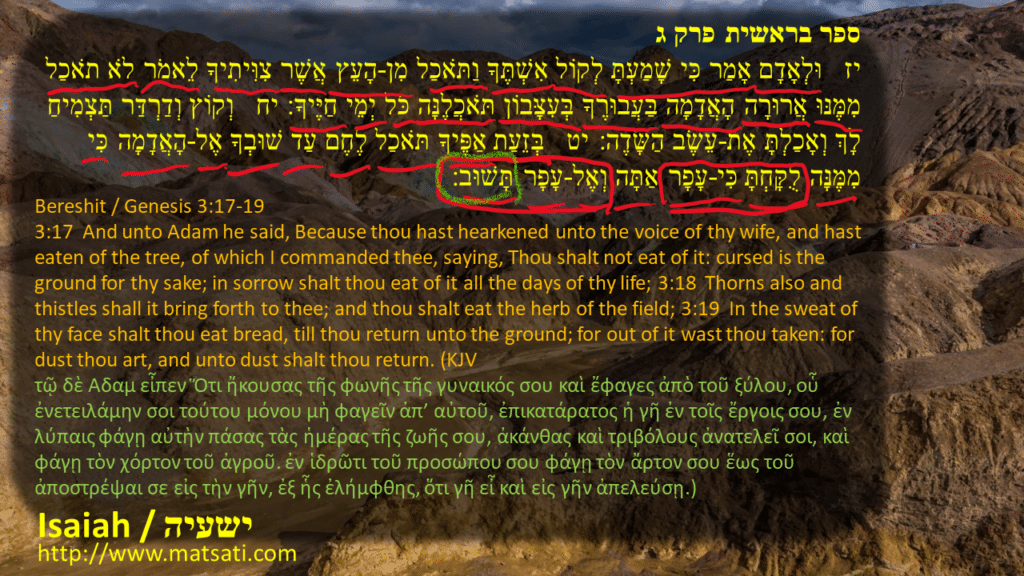
ספר בראשית פרק ג
יז וּלְאָדָם אָמַר כִּי שָׁמַעְתָּ לְקוֹל אִשְׁתֶּךָ וַתֹּאכַל מִן-הָעֵץ אֲשֶׁר צִוִּיתִיךָ לֵאמֹר לֹא תֹאכַל מִמֶּנּוּ אֲרוּרָה הָאֲדָמָה בַּעֲבוּרֶךָ בְּעִצָּבוֹן תֹּאכֲלֶנָּה כֹּל יְמֵי חַיֶּיךָ: יח וְקוֹץ וְדַרְדַּר תַּצְמִיחַ לָךְ וְאָכַלְתָּ אֶת-עֵשֶֹב הַשָּׂדֶה: יט בְּזֵעַת אַפֶּיךָ תֹּאכַל לֶחֶם עַד שׁוּבְךָ אֶל-הָאֲדָמָה כִּי מִמֶּנָּה לֻקָּחְתָּ כִּי-עָפָר אַתָּה וְאֶל-עָפָר תָּשׁוּב:
Bereshit / Genesis 3:17-19
3:17 And unto Adam he said, Because thou hast hearkened unto the voice of thy wife, and hast eaten of the tree, of which I commanded thee, saying, Thou shalt not eat of it: cursed is the ground for thy sake; in sorrow shalt thou eat of it all the days of thy life; 3:18 Thorns also and thistles shall it bring forth to thee; and thou shalt eat the herb of the field; 3:19 In the sweat of thy face shalt thou eat bread, till thou return unto the ground; for out of it wast thou taken: for dust thou art, and unto dust shalt thou return. (KJV, τῷ δὲ Αδαμ εἶπεν Ὅτι ἤκουσας τῆς φωνῆς τῆς γυναικός σου καὶ ἔφαγες ἀπὸ τοῦ ξύλου, οὗ ἐνετειλάμην σοι τούτου μόνου μὴ φαγεῖν ἀπʼ αὐτοῦ, ἐπικατάρατος ἡ γῆ ἐν τοῖς ἔργοις σου, ἐν λύπαις φάγῃ αὐτὴν πάσας τὰς ἡμέρας τῆς ζωῆς σου, ἀκάνθας καὶ τριβόλους ἀνατελεῖ σοι, καὶ φάγῃ τὸν χόρτον τοῦ ἀγροῦ. ἐν ἱδρῶτι τοῦ προσώπου σου φάγῃ τὸν ἄρτον σου ἕως τοῦ ἀποστρέψαι σε εἰς τὴν γῆν, ἐξ ἧς ἐλήμφθης, ὅτι γῆ εἶ καὶ εἰς γῆν ἀπελεύσῃ.)
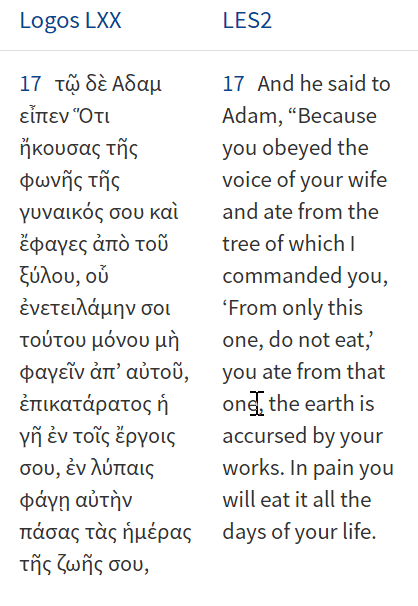
The earth was cursed (אֲרוּרָה הָאֲדָמָה, ἐπικατάρατος ἡ γῆ ἐν τοῖς ἔργοις σου) because of what Adam had done eating from the tree and violating the command of God. The LXX writes, ἐπικατάρατος ἡ γῆ ἐν τοῖς ἔργοις σου “cursed is the ground because of your works.” We note how this drives forward the concept of the imperfection of our works, of the things that we do, and how we are always relying upon the mercy of God, even in the things we do out of our love for God in heaven. We note how Isaiah 24:4 states אָבְלָה נָבְלָה הָאָרֶץ אֻמְלְלָה נָבְלָה תֵּבֵל אֻמְלָלוּ מְרוֹם עַם-הָאָרֶץ “The earth mourneth and fadeth away, the world languisheth and fadeth away, the haughty people of the earth do languish,” using the word תֵּבֵל meaning “the inhabited earth” which draws in the context of all the world, and not just Eretz Yisrael. We do note that God’s Torah remains valid for the judgment of sin against all of mankind. This illustrates how the whole earth, all men, women, and children, are given the same expectations that God has for Judah and Jerusalem, the people of the Holy Land. These chapters speak to us how the Torah is the model for all men, regardless of one’s nationality!
Isaiah begins chapter 24 saying the following:

ספר ישעיה פרק כד
א הִנֵּה יְהֹוָה בּוֹקֵק הָאָרֶץ וּבוֹלְקָהּ וְעִוָּה פָנֶיהָ וְהֵפִיץ יֹשְׁבֶיהָ:
Isaiah 24:1 states, “Behold, the LORD maketh the earth empty, and maketh it waste, and turneth it upside down, and scattereth abroad the inhabitants thereof. (הִנֵּה יְהֹוָה בּוֹקֵק הָאָרֶץ וּבוֹלְקָהּ וְעִוָּה פָנֶיהָ וְהֵפִיץ יֹשְׁבֶיהָ)” We note that this scattering abroad reminds us of the Torah narrative, what occurred just following the flood in Bereshit / Genesis 11:1-8.

ספר בראשית פרק יא
א וַיְהִי כָל-הָאָרֶץ שָֹפָה אֶחָת וּדְבָרִים אֲחָדִים: ב וַיְהִי בְּנָסְעָם מִקֶּדֶם וַיִּמְצְאוּ בִקְעָה בְּאֶרֶץ שִׁנְעָר וַיֵּשְׁבוּ שָׁם: ג וַיֹּאמְרוּ אִישׁ אֶל-רֵעֵהוּ הָבָה נִלְבְּנָה לְבֵנִים וְנִשְֹרְפָה לִשְֹרֵפָה וַתְּהִי לָהֶם הַלְּבֵנָה לְאָבֶן וְהַחֵמָר הָיָה לָהֶם לַחֹמֶר: ד וַיֹּאמְרוּ הָבָה | נִבְנֶה-לָּנוּ עִיר וּמִגְדָּל וְרֹאשׁוֹ בַשָּׁמַיִם וְנַעֲשֶֹה-לָּנוּ שֵׁם פֶּן-נָפוּץ עַל-פְּנֵי כָל-הָאָרֶץ: ה וַיֵּרֶד יְהֹוָה לִרְאֹת אֶת-הָעִיר וְאֶת-הַמִּגְדָּל אֲשֶׁר בָּנוּ בְּנֵי הָאָדָם: ו וַיֹּאמֶר יְהֹוָה הֵן עַם אֶחָד וְשָֹפָה אַחַת לְכֻלָּם וְזֶה הַחִלָּם לַעֲשֹוֹת וְעַתָּה לֹא-יִבָּצֵר מֵהֶם כֹּל אֲשֶׁר יָזְמוּ לַעֲשֹוֹת: ז הָבָה נֵרְדָה וְנָבְלָה שָׁם שְֹפָתָם אֲשֶׁר לֹא יִשְׁמְעוּ אִישׁ שְֹפַת רֵעֵהוּ: ח וַיָּפֶץ יְהֹוָה אֹתָם מִשָּׁם עַל-פְּנֵי כָל-הָאָרֶץ וַיַּחְדְּלוּ לִבְנֹת הָעִיר:
Bereshit / Genesis 11:1-8
11:1 And the whole earth was of one language, and of one speech. 11:2 And it came to pass, as they journeyed from the east, that they found a plain in the land of Shinar; and they dwelt there. 11:3 And they said one to another, Go to, let us make brick, and burn them thoroughly. And they had brick for stone, and slime had they for morter. 11:4 And they said, Go to, let us build us a city and a tower, whose top may reach unto heaven; and let us make us a name, lest we be scattered abroad upon the face of the whole earth. 11:5 And the LORD came down to see the city and the tower, which the children of men builded. 11:6 And the LORD said, Behold, the people is one, and they have all one language; and this they begin to do: and now nothing will be restrained from them, which they have imagined to do. 11:7 Go to, let us go down, and there confound their language, that they may not understand one another’s speech. 11:8 So the LORD scattered them abroad from thence upon the face of all the earth: and they left off to build the city. (KJV)
We note when we compare the texts, here the Genesis account writes in Bereshit / Genesis 11:8 וַיָּפֶץ יְהֹוָה אֹתָם מִשָּׁם עַל-פְּנֵי כָל-הָאָרֶץ וַיַּחְדְּלוּ לִבְנֹת הָעִיר and the Isaiah text writes הִנֵּה יְהֹוָה בּוֹקֵק הָאָרֶץ וּבוֹלְקָהּ וְעִוָּה פָנֶיהָ וְהֵפִיץ יֹשְׁבֶיהָ in both cases, we find the root פוץ “to be scattered” written as a Hif’il third person verb which indicates that God dispersed the people. Why do you think God chose to disperse the people? The reason is what we see in Bereshit / Genesis 11:6, וַיֹּאמֶר יְהֹוָה הֵן עַם אֶחָד וְשָֹפָה אַחַת לְכֻלָּם וְזֶה הַחִלָּם לַעֲשֹוֹת וְעַתָּה לֹא-יִבָּצֵר מֵהֶם כֹּל אֲשֶׁר יָזְמוּ לַעֲשֹוֹת 11:6 And the LORD said, Behold, the people is one, and they have all one language; and this they begin to do: and now nothing will be restrained from them, which they have imagined to do. (KJV) The idea is that when people get together to sin, just like what we see taking place here, they will be able to accomplish whatever it is they set their minds to. This is significant because we were created b’tzelem Elohim (in the image of God) so we have been given the ability to create new things. In this situation the objective was for sin and not for the glory of God. This is how the Lord God physically decreases the level of sin in a region or a nation. This is why Isaiah begins with הִנֵּה יְהֹוָה בּוֹקֵק הָאָרֶץ “behold God makes the land empty.” Emphasis is provided through the word הִנֵּה “behold” which looks to the immediacy and need to eliminate sin. We note from the Torah the text writes, כֹּל אֲשֶׁר יָזְמוּ לַעֲשֹוֹת “all that they plan to do” here the plans of man ultimately God will decide whether it will be allowed to proceed to completion. Because God is in control of history, it is to Him that we should seek and focus upon. We also note that those who dwell (יֹשְׁבֶיהָ) in the land will be dispersed (וְהֵפִיץ) speaks to how sin in a region will cause the earth itself to experience the curse to a greater level (i.e. emptiness,desolation, and destruction). We note that desolation does not have to come in the terms of nuclear war, or some catastrophe, but simply looking at the Torah text reveals something to consider.
ספר ויקרא פרק כו
יד וְאִם-לֹא תִשְׁמְעוּ לִי וְלֹא תַעֲשֹוּ אֵת כָּל-הַמִּצְוֹת הָאֵלֶּה: טו וְאִם-בְּחֻקֹּתַי תִּמְאָסוּ וְאִם אֶת-מִשְׁפָּטַי תִּגְעַל נַפְשְׁכֶם לְבִלְתִּי עֲשֹוֹת אֶת-כָּל-מִצְוֹתַי לְהַפְרְכֶם אֶת-בְּרִיתִי: טז אַף-אֲנִי אֶעֱשֶֹה-זֹּאת לָכֶם וְהִפְקַדְתִּי עֲלֵיכֶם בֶּהָלָה אֶת-הַשַּׁחֶפֶת וְאֶת-הַקַּדַּחַת מְכַלּוֹת עֵינַיִם וּמְדִיבֹת נָפֶשׁ וּזְרַעְתֶּם לָרִיק זַרְעֲכֶם וַאֲכָלֻהוּ אֹיְבֵיכֶם: יז וְנָתַתִּי פָנַי בָּכֶם וְנִגַּפְתֶּם לִפְנֵי אֹיְבֵיכֶם וְרָדוּ בָכֶם שֹֹנְאֵיכֶם וְנַסְתֶּם וְאֵין-רֹדֵף אֶתְכֶם: יח וְאִם-עַד-אֵלֶּה לֹא תִשְׁמְעוּ לִי וְיָסַפְתִּי לְיַסְּרָה אֶתְכֶם שֶׁבַע עַל-חַטֹּאתֵיכֶם: יט וְשָׁבַרְתִּי אֶת-גְּאוֹן עֻזְּכֶם וְנָתַתִּי אֶת-שְׁמֵיכֶם כַּבַּרְזֶל וְאֶת-אַרְצְכֶם כַּנְּחֻשָׁה: כ וְתַם לָרִיק כֹּחֲכֶם וְלֹא-תִתֵּן אַרְצְכֶם אֶת-יְבוּלָהּ וְעֵץ הָאָרֶץ לֹא יִתֵּן פִּרְיוֹ:
Vayikra / Leviticus 26:14-20
26:14 ‘But if you do not obey Me and do not carry out all these commandments, 26:15 if, instead, you reject My statutes, and if your soul abhors My ordinances so as not to carry out all My commandments, and so break My covenant, 26:16 I, in turn, will do this to you: I will appoint over you a sudden terror, consumption and fever that shall waste away the eyes and cause the soul to pine away; also, you shall sow your seed uselessly, for your enemies shall eat it up. 26:17 ‘And I will set My face against you so that you shall be struck down before your enemies; and those who hate you shall rule over you, and you shall flee when no one is pursuing you. 26:18 ‘If also after these things, you do not obey Me, then I will punish you seven times more for your sins. 26:19 ‘And I will also break down your pride of power; I will also make your sky like iron and your earth like bronze. 26:20 ‘And your strength shall be spent uselessly, for your land shall not yield its produce and the trees of the land shall not yield their fruit. (NASB)
The idea here is to the one who does not obey God’s word, these things will happen. Remember that obedience is synonymous to “listening” (וְאִם-לֹא תִשְׁמְעוּ) to the Word of God. If one does not listen, then the Lord will cause the land to be barren and stop the rains, and the sky will be like iron and the earth like bronze so that one cannot work the land for food, etc. Plants and trees will die, etc. The point is that desolation and destruction come by the Hand of God and does not need to come by some great cataclysmic disaster. The Torah also describes God bringing the sword, and not when the armies come, they burn down everything, the fields, the homes, the cities, another picture of utter destruction and desolation. We can imagine the literal fulfillment of these things, History bears them out, how sin leads to the fulfillment of the Torah narrative on the outcome of the one who turns from the ways of God! These things reveal to us how important it is to seek the Lord God our Father in heaven, and His Messiah Yeshua, to walk in God’s holy ways, and to make His Word a part of our lives!
Isaiah goes on saying according to Isaiah 24:2 the following:
ספר ישעיה פרק כד
ב וְהָיָה כָעָם כַּכֹּהֵן כַּעֶבֶד כַּאדֹנָיו כַּשִּׁפְחָה כַּגְּבִרְתָּהּ כַּקּוֹנֶה כַּמּוֹכֵר כַּמַּלְוֶה כַּלּוֶֹה כַּנֹּשֶׁה כַּאֲשֶׁר נֹשֶׁא בוֹ:
Isaiah 24:2 states, “And it shall be, as with the people, so with the priest; as with the servant, so with his master; as with the maid, so with her mistress; as with the buyer, so with the seller; as with the lender, so with the borrower; as with the taker of usury, so with the giver of usury to him. (וְהָיָה כָעָם כַּכֹּהֵן כַּעֶבֶד כַּאדֹנָיו כַּשִּׁפְחָה כַּגְּבִרְתָּהּ כַּקּוֹנֶה כַּמּוֹכֵר כַּמַּלְוֶה כַּלּוֶֹה כַּנֹּשֶׁה כַּאֲשֶׁר נֹשֶׁא בוֹ)” Here is a lengthy list of comparisons notice how Isaiah compares these groups of people. The priest (כַּכֹּהֵן) and the people (כָעָם) we get some insights from the Torah on Vayikra / Leviticus 10:1-3.
ספר ויקרא פרק י
א וַיִּקְחוּ בְנֵי-אַהֲרֹן נָדָב וַאֲבִיהוּא אִישׁ מַחְתָּתוֹ וַיִּתְּנוּ בָהֵן אֵשׁ וַיָּשִֹימוּ עָלֶיהָ קְטֹרֶת וַיַּקְרִיבוּ לִפְנֵי יְהוָֹה אֵשׁ זָרָה אֲשֶׁר לֹא צִוָּה אֹתָם: ב וַתֵּצֵא אֵשׁ מִלִּפְנֵי יְהוָֹה וַתֹּאכַל אוֹתָם וַיָּמֻתוּ לִפְנֵי יְהוָֹה: ג וַיֹּאמֶר מֹשֶׁה אֶל-אַהֲרֹן הוּא אֲשֶׁר-דִּבֶּר יְהוָֹה | לֵאמֹר בִּקְרֹבַי אֶקָּדֵשׁ וְעַל-פְּנֵי כָל-הָעָם אֶכָּבֵד וַיִּדֹּם אַהֲרֹן:
Vayikra / Leviticus 10:1-3
10 And Nadab and Abihu, the sons of Aaron, took either of them his censer, and put fire therein, and put incense thereon, and offered strange fire before the LORD, which he commanded them not. 2 And there went out fire from the LORD, and devoured them, and they died before the LORD. 3 Then Moses said unto Aaron, This is it that the LORD spake, saying, I will be sanctified in them that come nigh me, and before all the people I will be glorified. And Aaron held his peace. (KJV)
The significant point here concerning the priest (כַּכֹּהֵן) and the people (כָעָם) is related here in Vayikra / Leviticus 10:3. The event with Nadab and Abihu emphasizes how the priests are to reflect God’s holiness. Holiness is reflected in obedience to the Torah command, and Nadab and Abihu were not concerned with doing this. When Aaron brought a godly sacrifice, God showed His approval by consuming the offering. When Nadab and Abihu served wickedly, God showed His disapproval by consuming the ones who had brought the offering. We read how Nadab and Abihu “offered profane fire before the LORD” (Vayikra / Leviticus 10:1). The exact infraction is not exactly clear but suggests that the fire that was added was not from the coals of the altar. (Vayikra / Leviticus 16:12). The Lord God speaking specifically in Vayikra / Leviticus 10:9-11 against drinking alcoholic beverages before going into the tent of meeting suggests that drunkenness may have led to Nadab and Abihu’s sin. Regardless of the exact nature of the sin, their disobedience had not shown the proper respect and regard for God’s holiness, and this contrast here in Isaiah may be related to how the people in general are not responsible for a portion of the Torah that sanctifies the priests, but yet the people are to remain holy before the Lord walking in His righteous ways. Here Judah and Jerusalem had failed in their honoring God according to His word. We can see this contrast in the statement כַּעֶבֶד כַּאדֹנָיו כַּשִּׁפְחָה כַּגְּבִרְתָּהּ “like the servant, so as his lord, like the maidservant, so as her mistress (strong female).” The remainder of the verse speaks of buying and selling and even of the thief (כַּקּוֹנֶה כַּמּוֹכֵר כַּמַּלְוֶה כַּלּוֶֹה כַּנֹּשֶׁה כַּאֲשֶׁר נֹשֶׁא בוֹ). The point Isaiah may be making is in relation to rank and wealth, the righteous and the unrighteous, of the one who holds a position of power (lord) and the one who does not (servant), there is no special significance in man in the sight of God. (1 Samuel 16:7) We note how pride can easily be a part of these positions, and this is consistent with the continuing theme of Isaiah, that pride has no place in the presence of God. We note that James Pritchard in his book “The Ancient Near Eastern Texts Relating to the OT,” 3rd edition, p. 441 contains Egyptian Oracles and prophecies. Here we find the admonitions of Ipu-Wer.
THE ADMONITIONS OF IPU-WER
(i 1) … Door[keepers] say: “Let us go and plunder.” … The laundryman refuses to carry his load.… Bird [catchers] have marshaled the battle array.… [Men of] the Delta marshes carry shields. … (5) … A man regards his son as his enemy.… A man of character goes in mourning because of what has happened in the land.… Foreigners have become people everywhere.…
(ii 2) …WHY REALLY, the [face] is pale. The bow-man is ready. Robbery is everywhere. There is no man of yesterday.5…
WHY REALLY, the Nile is in flood, (but) no one plows for himself, (because) every man says: “We do not know what may happen throughout the land!”
WHY REALLY, women are dried up, and none can conceive. Khnum cannot fashion (mortals) because of the state of the land.
WHY REALLY, poor men have become the possessors of treasures. He who could not make himself (5) a pair of sandals is (now) the possessor of riches.…
WHY REALLY, many dead are buried in the river. The stream is a tomb, and the embalming-place has really become the stream.
WHY REALLY, nobles are in lamentation, while poor men have joy. Every town says: “Let us banish many from us.”
WHY REALLY, … dirt is throughout the land. There are really none (whose) clothes are white in these times.
WHY REALLY, the land spins around as a potter’s wheel does. The robber is (now) the possessor of riches.…
There are a few parallels here to the Isaiah text. Here the prophet is not foretelling the future but is standing before a pharaoh and condemning the past and present administration of Egypt. What we see here is how Egypt has suffered a breakdown of government, accompanied by social and economic chaos. These calamities met with indifference in the palace. As a result this man, Ipu-wer appeared at the palace and reported to the pharaoh the anarchy in the land. Ipu-wer ended with a denunciation of the king who evaded his responsibilities. This is what we see going on in the text concerning the state of the world. Note how these things are by the hand of God, the confusion that enters into the mind of man due to man turning from God’s holy ways! John Oswalt writes, “Several commentators argue that the lack of reference to a king is evidence for a postexilic date. However, Hos. 4:9, which is frequently referred to as the inspiration for this verse, makes no mention of a king either and Hosea is surely preexilic (cf. Skinner and Cheyne).”
Isaiah continues according to Isaiah 24:3.
ספר ישעיה פרק כד
ג הִבּוֹק | תִּבּוֹק הָאָרֶץ וְהִבּוֹז | תִּבּוֹז כִּי יְהֹוָה דִּבֶּר אֶת-הַדָּבָר הַזֶּה:
Isaiah 24:3 states, “The land shall be utterly emptied, and utterly spoiled: for the LORD hath spoken this word. (הִבּוֹק | תִּבּוֹק הָאָרֶץ וְהִבּוֹז | תִּבּוֹז כִּי יְהֹוָה דִּבֶּר אֶת-הַדָּבָר הַזֶּה)” Here Isaiah states הִבּוֹק | תִּבּוֹק הָאָרֶץ using the word הִבּוֹק written as a Nif’al verb infinitive absolute meaning “to devastate” and תִּבּוֹק written as a Nif’al verb imperfect which forms the command “the earth will be devastated.” This is why the KJV translated “the land shall be utterly emptied.” We note the same verb pattern for the next two words וְהִבּוֹז | תִּבּוֹז referring to the spoils of war, saying “the earth will be utterly spoiled.” Isaiah emphasizes these things through the repetition of these words coupled with saying כִּי יְהֹוָה דִּבֶּר אֶת-הַדָּבָר הַזֶּה “because God has spoken this word!”

The LXX agrees with the MSS text. We note the TgJ translates וְאִיתְדָשָא תִתְדֵיש “threshing, threshing” as opposed to the spoils of war. This is the idea of total destruction which is being envisioned which is the underlying point of Isaiah’s use of the infinitive absolute verbs to emphasize this. We note how warfare, pride, oppression, and greed will all be a part of this devastation. We note that these things come true because God has spoken. What this reveal to us is when God’s people are anemic, sinful, and do not walk in the power of God, is it not because God’s people no longer have the convictions of the prophets? As we continue, Isaiah 24:4-6 further develops these concepts of devastation of the land. We note from the Tanakh, the people were serving the fertility religions which is illustrated through mourning Tammuz (i.e. 1 Kings 18:26-29, Ezekiel 8:14, Zechariah 12:11). These things illustrate why God condemned their practices, and why God stopped the rains which brought drought and death to the land. We note that if there is desolation on the Earth, it is because of the work of God, just as in the case of abundant life. The Major struggle here is to not be deceived by false religions, not to be seduced to sexual sin, and to overcome pride and lusts in one’s life. We are to trust in the Lord, which means making the intentional thought and action to “commit myself to the Lord God and His Messiah;” it is only in this way that we will be blessed of God!
Isaiah goes on saying according to Isaiah 24:4-5.
ספר ישעיה פרק כד
ד אָבְלָה נָבְלָה הָאָרֶץ אֻמְלְלָה נָבְלָה תֵּבֵל אֻמְלָלוּ מְרוֹם עַם-הָאָרֶץ: ה וְהָאָרֶץ חָנְפָה תַּחַת יֹשְׁבֶיהָ כִּי-עָבְרוּ תוֹרֹת חָלְפוּ חֹק הֵפֵרוּ בְּרִית עוֹלָם: ו עַל-כֵּן אָלָה אָכְלָה אֶרֶץ וַיֶּאְשְׁמוּ ישְׁבֵי בָהּ עַל-כֵּן חָרוּ ישְׁבֵי אֶרֶץ וְנִשְׁאַר אֱנוֹשׁ מִזְעָר:
Isaiah 24:4 states, “The earth mourneth and fadeth away, the world languisheth and fadeth away, the haughty people of the earth do languish. (אָבְלָה נָבְלָה הָאָרֶץ אֻמְלְלָה נָבְלָה תֵּבֵל אֻמְלָלוּ מְרוֹם עַם-הָאָרֶץ)” Isaiah 24:5 “The earth also is defiled under the inhabitants thereof; (וְהָאָרֶץ חָנְפָה תַּחַת יֹשְׁבֶיהָ) because they have transgressed the laws, changed the ordinance, broken the everlasting covenant. (כִּי-עָבְרוּ תוֹרֹת חָלְפוּ חֹק הֵפֵרוּ בְּרִית עוֹלָם)” Isaiah 24:6 “Therefore hath the curse devoured the earth, and they that dwell therein are desolate: therefore the inhabitants of the earth are burned, and few men left. (עַל-כֵּן אָלָה אָכְלָה אֶרֶץ וַיֶּאְשְׁמוּ ישְׁבֵי בָהּ עַל-כֵּן חָרוּ ישְׁבֵי אֶרֶץ וְנִשְׁאַר אֱנוֹשׁ מִזְעָר)” Note the repetition of נָבְלָה meaning “to fade or be foolish” and אֻמְלְלָה meaning “wither” the repetition contributes to the emphasis of this aspect of the land. Note Isaiah uses both the words הָאָרֶץ and תֵּבֵל and specifically the use of the word תֵּבֵל makes it clear that these things are happening to the Earth as a whole and not just the Land of Israel which is described as Haaretz (הָאָרֶץ). Also Isaiah says, אֻמְלָלוּ מְרוֹם עַם-הָאָרֶץ “will wither the height of the people of the earth.” The height of the people is a reference again to pride! We note today more than ever, when there are supply chain problems in terms of drought and famine, that all of the world is affected, both the low and the high, those who are in positions of power, and those who are not, all will be affected. We note that the false gods and idol worship throughout the world is the description of the earth that is defiled. The earth is not just defiled through these things, the earth is defiled also through sin of any sort, especially that of corruption, murder, theft, and immorality. All of these things defile the land and bring the curse as described according to God’s Torah. This is why Isaiah wrote, וְהָאָרֶץ חָנְפָה תַּחַת יֹשְׁבֶיהָ כִּי-עָבְרוּ תוֹרֹת חָלְפוּ חֹק הֵפֵרוּ בְּרִית עוֹלָם “The earth also is defiled under the inhabitants thereof; because they have transgressed the laws, changed the ordinance, broken the everlasting covenant.” The end result is the bringing of the curse (Isaiah 24:6), demonstrating how Isaiah is consistent with the Torah in regard to these things. A comparison of the LXX, MSS, TgJ, and L-Peshitta shows the following concerning Isaiah 24:4-6.
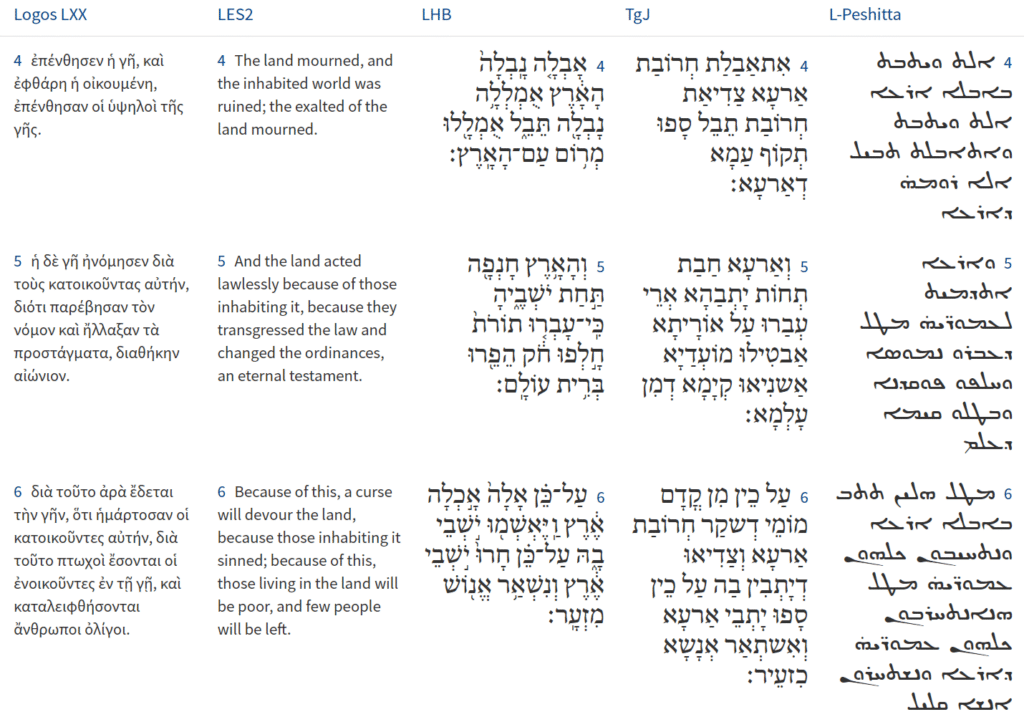
We note that how the LXX translates saying explicitly, ἡ δὲ γῆ ἠνόμησεν διὰ τοὺς κατοικοῦντας αὐτήν, διότι παρέβησαν τὸν νόμον καὶ ἤλλαξαν τὰ προστάγματα, διαθήκην αἰώνιον “And the land acted lawlessly because of those inhabiting it, because they transgressed the law and changed the ordinances, an eternal testament.” The LXX points out how ἠνόμησεν means “to be lawless, sin” and it is those who inhabit the earth who defile the earth διότι παρέβησαν τὸν νόμον “because they pass buy or go beyond the Law” the Torah of God. The LXX goes as far as to say they changed the commandment (καὶ ἤλλαξαν τὰ προστάγματα) which is an διαθήκην αἰώνιον (eternal testament). Notice how the LXX calls the Torah God’s “eternal testament!” This is significant and demonstrates why we should study the Torah of God! This is not an irrelevant text today; it is very relevant and important for instruction in righteousness! (2 Timothy 3:16-17) Because of sin the earth is polluted because sin has a way of making things unclean, especially the land, which is analogous to all of the people becoming corrupt living in such a condition, and near a people who are lost. We note in the political sphere today in the USA, how hatred and dishonesty pollute! Look at the massive levels of corruption in the electoral system itself in the USA. Isaiah is demonstrating the Torah requirement upon all the earth, very similar to the way that Paul did according to Romans 1-3. These things speak to the fundamental principles of Torah that are incorporated into every human being at birth, knowing the difference between right and wrong in terms of murder (bloodshed) and theft. We note that the Lord God Almighty promises an abundant life in return for living according to the standards of the Torah. This is valid even for us today, we note the NT dictum given by Paul in Galatians 5:22 on the fruit of the spirit are love, joy, peace, and how the one who is a child of God demonstrates such things. We again note the Torah mandate of the blessings and the curses according to Devarim / Deuteronomy 27-28. The blessing comes by keeping the covenant, and the curse comes by breaking it. Isn’t it interesting how all of the world will be destroyed due to this very thing, the curse coming due to sin and rebellion? We note because God has given his Torah, the end results of sin, destruction, devastation, and spoils, are not an arbitrary punishment on God’s part. These are natural consequences of sin (Bereshit / Genesis 3:17) and validate the importance of Torah today! We note that nothing can remove these failures on the part of mankind, except God Himself (see Tehillim / Psalms 34:22-23, Isaiah 4:2-4, 53:12, Zechariah 3:9, 13:1, 2 Corinthians 5:18-21). The major point is though that one must receive this pardon of God through faith! The world insists it is not guilty before God, and the consequences of the lack of faith will be devastating! Sin pollutes this earth, and this is why God seeks us out, He calls us to righteousness and truth, and He provides us with help by His indwelling Spirit! All of these things of life, peace, and truth can be received through faith in Yeshua the Messiah! If one does not have faith in God our Father in heaven and in His Son Yeshua, the end result is the eventual destruction of life (Isaiah 13:11-12). Is it any wonder why Isaiah is the most quoted book in all of the Bible (besides the Psalms)?
Isaiah continues according to Isaiah 24:7-8.
ספר ישעיה פרק כד
ז אָבַל תִּירוֹשׁ אֻמְלְלָה-גָפֶן נֶאֶנְחוּ כָּל-שִֹמְחֵי-לֵב: ח שָׁבַת מְשֹוֹשֹ תֻּפִּים חָדַל שְׁאוֹן עַלִּיזִים שָׁבַת מְשֹוֹשֹ כִּנּוֹר:
Isaiah 24:7 states, “The new wine mourneth, the vine languisheth, all the merryhearted do sigh. (אָבַל תִּירוֹשׁ אֻמְלְלָה-גָפֶן נֶאֶנְחוּ כָּל-שִֹמְחֵי-לֵב)” Isaiah 24:8 “The mirth of tabrets ceaseth, the noise of them that rejoice endeth, the joy of the harp ceaseth. (שָׁבַת מְשֹוֹשֹ תֻּפִּים חָדַל שְׁאוֹן עַלִּיזִים שָׁבַת מְשֹוֹשֹ כִּנּוֹר)” Note when reading this section of verses, sweet wine ( תִּיר֖וֹש) is mentioned again and again (see Isaiah 24:7, 24:8, 24:9, 24:11, 24:13). Isaiah 24:7 writes that the vine mourns (אֻמְלְלָה-גָפֶן) and all the joyful of heart (כָּל-שִֹמְחֵי-לֵב) sigh or groan (נֶאֶנְחוּ). We note that the harvest time for grapes is a time of rejoicing but here we find Isaiah saying it is a time of sorrow. A text comparison of the LXX, MSS, TgJ, and L-Peshitta shows the following.
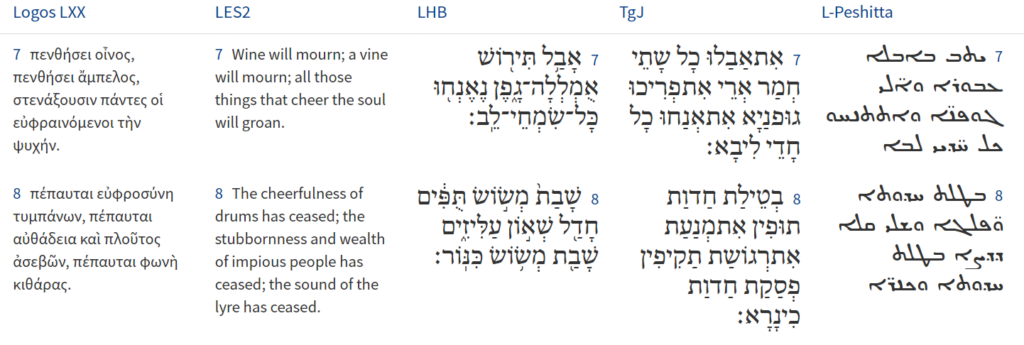
The TgJ translates saying פְסַקַת חַדוַת כִינָרָא “come to an end the joy of the lyre.” We note how the LXX couples these things to the wealth of the rich ceased and the sound of the drums ceasing. These things remind us of the life of the party, and how self-sufficiency always has its end. In this case based upon the context, the joy of the entire world has ceased. This can be analogized to the merriment of alcoholic beverages, when in the drunken moment brings joy and merriment, but in the morning comes the nausea, headache, and pain. Note how this is how this kind of entertainment has its end. This is a function of the workings of the flesh and when people pursue these things it demonstrates a deeper dependency and hollowed place in one’s life. This emptiness needs to be filled by the presence of God. We note that the concept of new wine does not mean that this is an unfermented drink. New wine simply means that the wine has not been aged for taste. We note the commentaries like John Oswalt make these kinds of naive statements concerning the definition of “new wine.” The fact of the matter is wine tastes better with age because of a complex chemical reaction occurring among sugars, acids and substances known as phenolic compounds. In time, this chemical reaction can affect the taste of wine in a way that gives it a pleasing flavor. The chemical reaction can also change the color and aroma of the alcohol, in addition to altering the way the wine feels and tastes in the mouth. Examples of wines with high phenol levels are Cabernet Sauvignon, Nebbiolo and Syrah. Unfermented drinks do not bring merriment and joy. It may be possible however that in the hurry to bring the joy and merriment of alcohol they broke into the wine before it was finished fermenting and so they did not get desired effects. The whole point is that the people relied upon the works of the flesh to bring themselves happiness. Instead, this led to disappointment and disgrace. The ceasing of all of these things Isaiah is pointedly emphasizing the barrenness of the land, the places of the world where the parties took place have ended, and now there is the stark reality that the wrath of God is coming. Note the verbs for “ceases” ( שָׁבַת֙ and חָדַ֖ל) indicate that the judgment of God has come upon the earth and so all of the festivals disappear. The major point is that those who have depended upon their own resources for joy will have none. (See Isaiah 13:20-22, 22:1-4, 32:12-14.) Ultimately it is the Lord God our Father in heaven whom we are to seek as the source of our joy, and He will give us the kind of joy that is eternal. All of the things on this earth are fleeting. The things of God such as the joy of the Lord are eternal!
Rabbinic Commentary
The Targum Jonathan is an Aramaic and Rabbinic translation of the book of Isaiah and therefore is a valuable resource for our studying the book of Isaiah.
תרגום יונתן בן עוזיאל אל ישעיה פרק כד:א-ח
א הָא יוי מַבֵיז יָת אַרעָא וּמָסַר לֵיה לְסָנְאָה וְתִחפֵי בַהתָא אַפֵי רַברְבַהָא עַל דַעְבַרוּ עַל אֹורָיתָא וִיבַדַר יָת דְיָתְבִין בַה׃ ב וִיהֵי חִילֹונָאָה כְכָהְנָא עַבדָא כְרִיבֹונֵיה אַמתָא כְמָרְתַה זָבְנָא כִמזַבְנָא יָזְפָא כְמֹוזְפָא רָשיָא כְמַן דְרָשֵי בֵיה׃ ג אִתבְזָזָא תִתבְזֵיז אַרעָא וְאִיתְדָשָא תִתְדֵיש אְרֵי יוי מַלֵיל יָת פִתגָמָא הָדֵין׃ ד אִתאַבַלַת חְרֹובַת אַרעָא צַדִיאַת חְרֹובַת תֵבֵל סָפוּ תְקֹוף עַמָא דְאַרעָא׃ ה וְאַרעָא חַבַת תְחֹות יָתְבַהָא אְרֵי עְבַרוּ עַל אֹורָיתָא אַבטִילוּ מֹועְדַיָא אַשנִיאוּ קְיָמָא דְמִן עָלְמָא׃ ו עַל כֵין מִן קֳדָם מֹומֵי דְשקַר חְרֹובַת אַרעָא וְצַדִיאוּ דְיָתְבִין בַה עַל כֵין סָפוּ יָתְבֵי אַרעָא וְאִשתְאַר אְנָשָא כִזעֵיר׃ ז אִתאַבַלוּ כָל שָתֵי חְמַר אְרֵי אִתפְרִיכוּ גוּפנַיָא אִתאְנַחוּ כָל חָדֵי לִיבָא׃ ח בְטֵילַת חַדוַת תוּפִין אִתמְנַעַת אִתרְגֹושַת תַקִיפִין פְסַקַת חַדוַת כִינָרָא׃
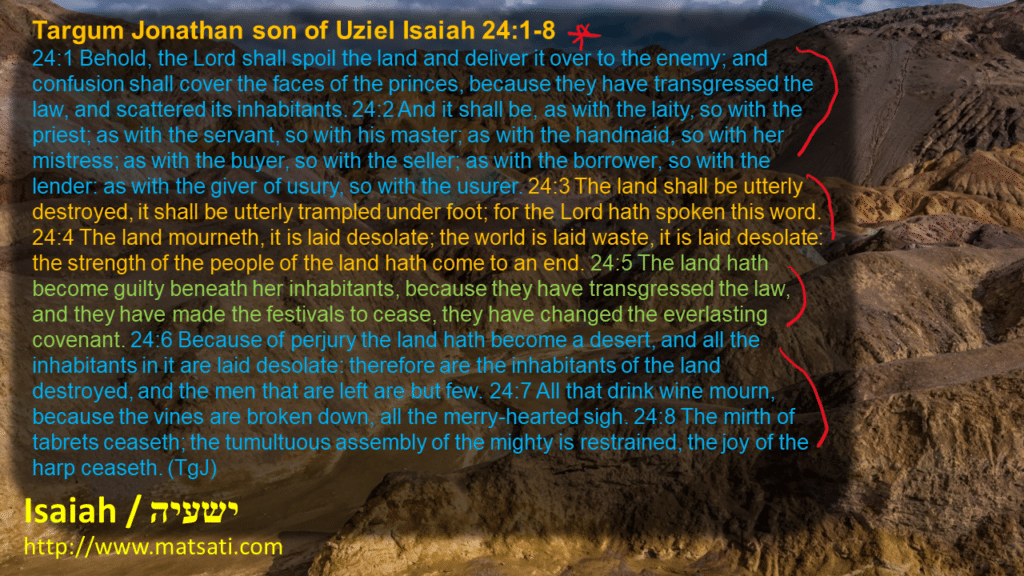
Targum Jonathan son of Uziel Isaiah 24:1-8
24:1 Behold, the Lord shall spoil the land and deliver it over to the enemy; and confusion shall cover the faces of the princes, because they have transgressed the law, and scattered its inhabitants. 24:2 And it shall be, as with the laity, so with the priest; as with the servant, so with his master; as with the handmaid, so with her mistress; as with the buyer, so with the seller; as with the borrower, so with the lender: as with the giver of usury, so with the usurer. 24:3 The land shall be utterly destroyed, it shall be utterly trampled under foot; for the Lord hath spoken this word. 24:4 The land mourneth, it is laid desolate; the world is laid waste, it is laid desolate: the strength of the people of the land hath come to an end. 24:5 The land hath become guilty beneath her inhabitants, because they have transgressed the law, and they have made the festivals to cease, they have changed the everlasting covenant. 24:6 Because of perjury the land hath become a desert, and all the inhabitants in it are laid desolate: therefore are the inhabitants of the land destroyed, and the men that are left are but few. 24:7 All that drink wine mourn, because the vines are broken down, all the merry-hearted sigh. 24:8 The mirth of tabrets ceaseth; the tumultuous assembly of the mighty is restrained, the joy of the harp ceaseth. (TgJ)
The TgJ describes a fundamental truth concerning God’s Torah according to Isaiah 24:1-2 speaking to it in a world wide context. The Hebrew scriptures describe the Torah in the following way:
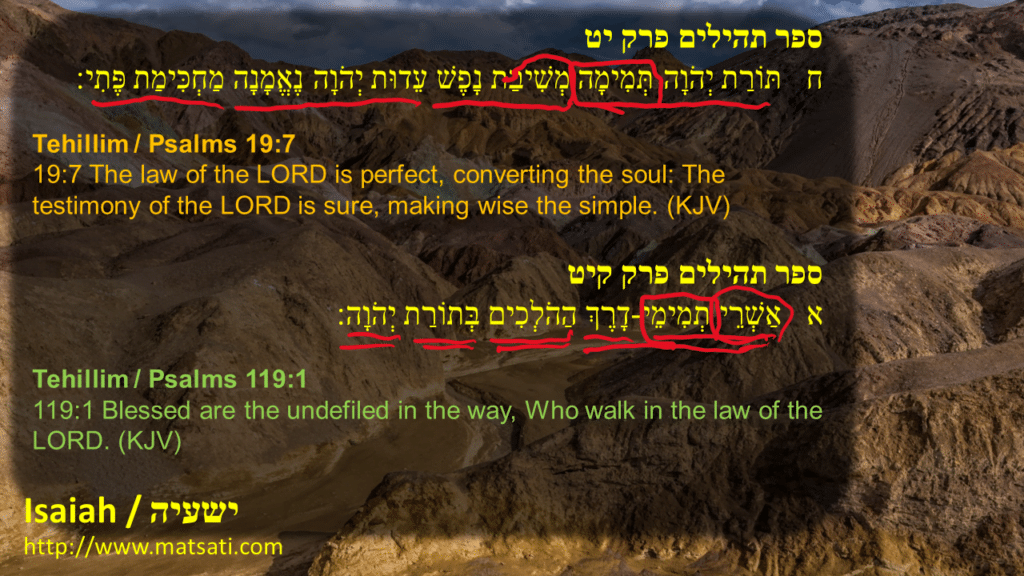
ספר תהילים פרק יט
ח תּוֹרַת יְהֹוָה תְּמִימָה מְשִׁיבַת נָפֶשׁ עֵדוּת יְהֹוָה נֶאֱמָנָה מַחְכִּימַת פֶּתִי:
Tehillim / Psalms 19:7
19:7 The law of the LORD is perfect, converting the soul: The testimony of the LORD is sure, making wise the simple. (KJV)
ספר תהילים פרק קיט
א אַשְׁרֵי תְמִימֵי-דָרֶךְ הַהֹלְכִים בְּתוֹרַת יְהֹוָה:
Tehillim / Psalms 119:1
119:1 Blessed are the undefiled in the way, Who walk in the law of the LORD. (KJV)
We note how the psalmist describes the Torah of God, as perfecting the soul and blessing the one who walks in it. Here the psalmist does not specify a people or a nation in his declaration, but reveals the divine standard for life, regardless of one’s heredity, social status, education, and so on. Yeshua Himself said “you therefore must be perfect as your Father is perfect.” (Matthew 5:48) James wrote saying, “for whosoever shall keep the whole law, and yet offend in one point, he is guilty of all.” (James 2:10) These things speak to the perfection of God’s Torah and the limited means of mankind to obey the Word of God. Something to note is that the Torah does not change to accommodate the weakness of man but stands as an eternal truth in God’s standard for righteousness. The word Torah itself means “direction” or “instruction” regarding the revelation of God’s will for mankind. It is because the Torah itself means “instruction / direction” that the TgJ writes what it does according to Isaiah 24:1-2, א הָא יוי מַבֵיז יָת אַרעָא וּמָסַר לֵיה לְסָנְאָה וְתִחפֵי בַהתָא אַפֵי רַברְבַהָא עַל דַעְבַרוּ עַל אֹורָיתָא וִיבַדַר יָת דְיָתְבִין בַה׃ 24:1 Behold, the Lord shall spoil the land and deliver it over to the enemy; and confusion shall cover the faces of the princes, because they have transgressed the law, and scattered its inhabitants. ב וִיהֵי חִילֹונָאָה כְכָהְנָא עַבדָא כְרִיבֹונֵיה אַמתָא כְמָרְתַה זָבְנָא כִמזַבְנָא יָזְפָא כְמֹוזְפָא רָשיָא כְמַן דְרָשֵי בֵיה׃ 24:2 And it shall be, as with the laity, so with the priest; as with the servant, so with his master; as with the handmaid, so with her mistress; as with the buyer, so with the seller; as with the borrower, so with the lender: as with the giver of usury, so with the usurer. (TgJ) Here we are told that the Lord God מַבֵיז יָת אַרעָא “spoils the land” meaning that the earth is delivered to the enemy because of the transgression of the Torah (law). In verse 2, every person will be in the same situation, treated equally, no one will be given preferential treatment. (Isaiah 24:2) The idea of the eternality of the Torah as a standard for truth is written explicitly in various places throughout the Scriptures (Isaiah 40:8). This is how the rabbis understand the importance of the Torah. Consider how the Talmud Bavli Shabbat 119b describes these things in connection to these verses.
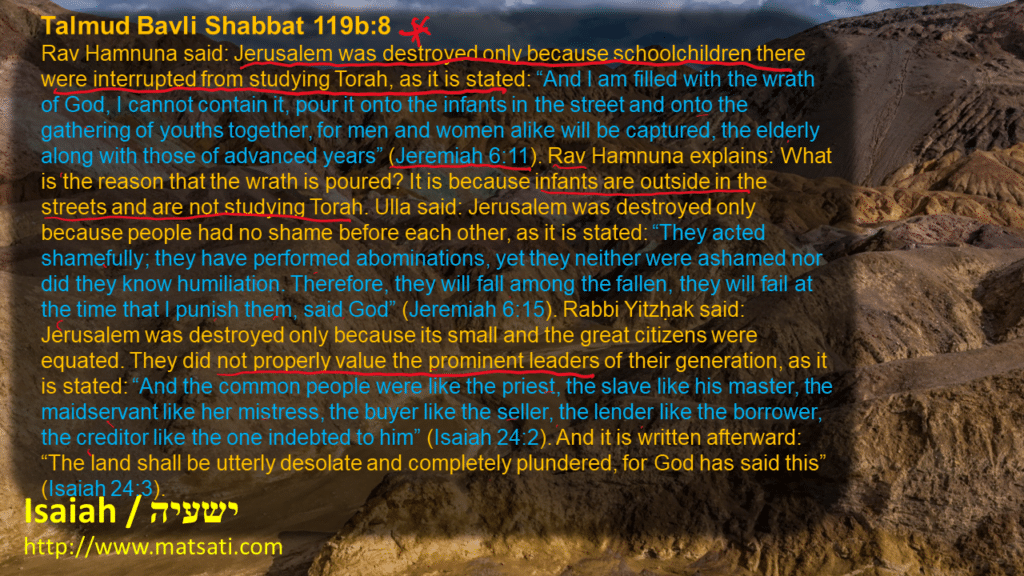
Talmud Bavli Shabbat 119b:8
Rav Hamnuna said: Jerusalem was destroyed only because schoolchildren there were interrupted from studying Torah, as it is stated: “And I am filled with the wrath of God, I cannot contain it, pour it onto the infants in the street and onto the gathering of youths together, for men and women alike will be captured, the elderly along with those of advanced years” (Jeremiah 6:11). Rav Hamnuna explains: What is the reason that the wrath is poured? It is because infants are outside in the streets and are not studying Torah. Ulla said: Jerusalem was destroyed only because people had no shame before each other, as it is stated: “They acted shamefully; they have performed abominations, yet they neither were ashamed nor did they know humiliation. Therefore, they will fall among the fallen, they will fail at the time that I punish them, said God” (Jeremiah 6:15). Rabbi Yitzḥak said: Jerusalem was destroyed only because its small and the great citizens were equated. They did not properly value the prominent leaders of their generation, as it is stated: “And the common people were like the priest, the slave like his master, the maidservant like her mistress, the buyer like the seller, the lender like the borrower, the creditor like the one indebted to him” (Isaiah 24:2). And it is written afterward: “The land shall be utterly desolate and completely plundered, for God has said this” (Isaiah 24:3).
The rabbis argue that the reason Jerusalem was destroyed was because school children were interrupted from studying Torah. It is important to note that when the orthodox say they are studying Torah, they are referring to Talmud. Here we are speaking of the Torah of Moshe in the Bible. The reason for destruction of Jerusalem is due to not training up the children in the way that they should go. (Mishley / Proverbs 22:6) This is what the Lord God wrote according to the Torah concerning His people.
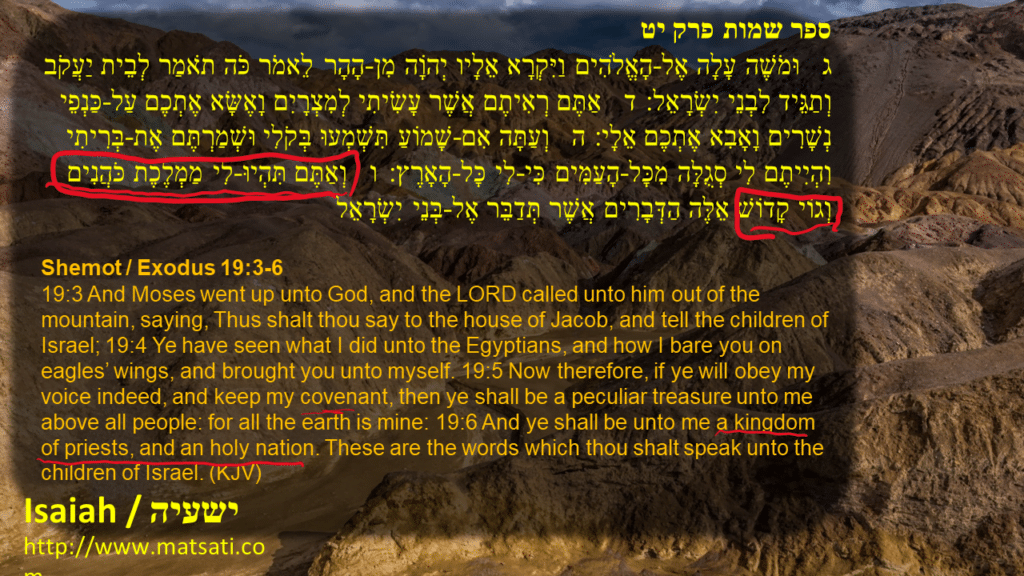
ספר שמות פרק יט
[ג וּמֹשֶׁה עָלָה אֶל-הָאֱלֹהִים וַיִּקְרָא אֵלָיו יְהוָֹה מִן-הָהָר לֵאמֹר כֹּה תֹאמַר לְבֵית יַעֲקֹב וְתַגֵּיד לִבְנֵי יִשְֹרָאֵל: ד אַתֶּם רְאִיתֶם אֲשֶׁר עָשִֹיתִי לְמִצְרָיִם וָאֶשָּׂא אֶתְכֶם עַל-כַּנְפֵי נְשָׁרִים וָאָבִא אֶתְכֶם אֵלָי: ה וְעַתָּה אִם-שָׁמוֹעַ תִּשְׁמְעוּ בְּקֹלִי וּשְׁמַרְתֶּם אֶת-בְּרִיתִי וִהְיִיתֶם לִי סְגֻלָּה מִכָּל-הָעַמִּים כִּי-לִי כָּל-הָאָרֶץ: ו וְאַתֶּם תִּהְיוּ-לִי מַמְלֶכֶת כֹּהֲנִים וְגוֹי קָדוֹשׁ אֵלֶּה הַדְּבָרִים אֲשֶׁר תְּדַבֵּר אֶל-בְּנֵי יִשְֹרָאֵל:
Shemot / Exodus 19:3-6
19:3 And Moses went up unto God, and the LORD called unto him out of the mountain, saying, Thus shalt thou say to the house of Jacob, and tell the children of Israel; 19:4 Ye have seen what I did unto the Egyptians, and how I bare you on eagles’ wings, and brought you unto myself. 19:5 Now therefore, if ye will obey my voice indeed, and keep my covenant, then ye shall be a peculiar treasure unto me above all people: for all the earth is mine: 19:6 And ye shall be unto me a kingdom of priests, and an holy nation. These are the words which thou shalt speak unto the children of Israel. (KJV)
We read how Moshe went up to the Lord and God said “Thus shalt thou say to the house of Jacob and tell the children of Israel.” Now we note how God had delivered a mixed multitude from Egypt, the Torah states this in multiple places. These are those who have joined themselves with Israel. Notice the difference here, the one who joins himself wants the things of God, and so the Torah of God has it’s application. Here in Isaiah, we find an interesting perspective, how the nations, all the world, are being judged according to God’s standard for living, the Torah. We note that there are different expectations due to whether one joins himself with the God of Israel or not. The point of these Scriptures is that all the world should be “Torah Aware” meaning that one takes seriously the plane reading of the Torah, context, historical narrative, the peshat (https://www.matsati.com/index.php/hermeneutics/) and especially while reading the NT text. The rabbis in the Talmud speak to the eventual falling away from the Lord. This happens incrementally, as the rabbis argue it starts or begins with the children being interrupted from studying Torah (the instruction of God). Without the proper upbringing, this leads to the destruction of the holy place of God. Note how it begins with abandoning the seriousness of the dictum to study the Scriptures, meaning that we study less and less until finally we stop. When this happens, one doesn’t feel this is a very serious problem, since one still attends services and “tries to be a good person” by avoiding the bigger sins. This approach to a life of holiness leads to apostasy. The point is that if the study of the Scriptures isn’t our highest priority, then we will forget about the Lord God in heaven. Then our children will see these things, and they themselves will turn from the study of the Scriptures, and from the Lord, and the final state is as what we are reading here according to Isaiah. These things are all related to our testimony and witness to others, especially to our families and our community. The moment we consider the study of the Scriptures and our testimony as being only optional, it is then that one falls into greater disobedience to the word of God. This then leads to one’s acceptance of sin and flirting with lifestyle choices such as LGBTQ. The remedy to these things is to return, to repent, and to turn to the Torah and the Scriptures, to have faith in God and in His Messiah Yeshua, and make the effort to be intentional in applying God’s word to all areas of life with all our heart, soul, mind, and strength. (Devarim / Deuteronomy 6:4-10)
Isaiah continues according to the TgJ saying, ג אִתבְזָזָא תִתבְזֵיז אַרעָא וְאִיתְדָשָא תִתְדֵיש אְרֵי יוי מַלֵיל יָת פִתגָמָא הָדֵין׃ 24:3 The land shall be utterly destroyed, it shall be utterly trampled under foot; for the Lord hath spoken this word. ד אִתאַבַלַת חְרֹובַת אַרעָא צַדִיאַת חְרֹובַת תֵבֵל סָפוּ תְקֹוף עַמָא דְאַרעָא׃ 24:4 The land mourneth, it is laid desolate; the world is laid waste, it is laid desolate: the strength of the people of the land hath come to an end. (TgJ) We note that when Israel is destroyed, all of the earth follows suit. This is the outcome of being a people who profess to believe in the authority of God’s Word, for example that the Tanakh is authoritative today but yet functionally regulate the study of the instruction of God to the back seat in one’s life. This means that the Scriptures are not really taken seriously, and this is easy to do, to confess faith in the Word of God, but to not apply it to all of life. Rashi writes the following concerning these verses:
Rashi on Isaiah 24,4 Part 1-4
נבלה. כמו (ירמיהו ח׳:י״ג) והעלה נבל ל’ כמש ותשות כח: it has withered (נָבְלָה) Comp. (Jeremiah 8:13) “And the leaf has withered (נָבֵל).” An expression of withering and languishing.
אומללה. ל’ שפלות כמו היהודים האמללים (נחמיה ה’ ג): has been humbled (אֻמְלְלָה), an expression of humility. Comp. (Neh. 3: 34) “humble Jews (אֻמְלָלִים).”
תבל. היא א”י שהיא מתובלת במצות הרבה: The land (תֵּבֵל) This is the land of Israel, which is spiced (מְתֻבֶּלֶת) with many commandments.
מרום עם הארץ. גאון עם הארץ: the highest of the people of the land the pride of the people of the land.
Rashi discusses these verses in relation to humbling and humility before God. He states that the land of Israel is “spiced” with the mitzvot (commandments). Humility is the underlying principle of faith. When we consider this and the idea of spicing the land with mitzvot, we are reminded of the story of Yeshua healing the ten lepers according to Luke 17:11-19. When Yeshua healed them, there was only one who returned, fell at Yeshua’s feet, and gave praise and glory to God in heaven demonstrating humility. Yeshua spoke earlier in Luke 17:5-10 of the slave who served his master, toiling in the fields during the day, and when coming home was given the task to prepare his dinner. Yeshua says then “In the same way, when you have done all that you were commanded, you should say, ‘We are good-for-nothing [unworthy] slaves; we’ve only done our duty.’” We note something about humility in regard to the commands / mitzvot of God. Because of the covenant we have entered into, the mitzvot are a duty, they are the terms of our agreement by faith in Yeshua. This means that As we seek the LORD, our desire is to serve Him and do His work because of our love and faith in Him. That duty and accompanying faith provides us the power we need to thrive as we serve Him and others in His name. As Yeshua said this is our duty (Luke 17:10). If this is so, then why do some amass so much pride in obeying the commandments of God? I know some who literally beat people over the head in the name of God’s Word, tarnishing their own testimony, and the testimony of God. This is a reminder for us to remain humble, especially in light of what Isaiah is saying concerning the destruction of the world due to sin (disobedience).
Isaiah continues saying the following according to Isaiah 24:5, ה וְאַרעָא חַבַת תְחֹות יָתְבַהָא אְרֵי עְבַרוּ עַל אֹורָיתָא אַבטִילוּ מֹועְדַיָא אַשנִיאוּ קְיָמָא דְמִן עָלְמָא׃ 24:5 The land hath become guilty beneath her inhabitants, because they have transgressed the law, and they have made the festivals to cease, they have changed the everlasting covenant. (TgJ) Here the rabbinic interpretation on this is that the Earth was defiled under its inhabitants. It is important to note that the reason the Earth was defiled was due to the transgression of the Torah, and the example was given that the inhabitants of the Earth had changed the everlasting covenant. This is illustrated according to Midrash Tanchuman Buber Re’eh 11:1.
Midrash Tanchuma Buber, Re’eh 11:1
(Is. 24:5:) AND THE EARTH WAS DEFILED UNDER ITS INHABITANTS, . It may show you standing grain, but it does not show you a shock of sheaves.28Tanh., Deut. 4:14; PRK 10:5; see PR 25:3. It may show you a shock of sheaves, but it does not show you a threshing floor. It may show you a threshing floor, but it does not show winnowed heap. Why ? (Ibid.:) BECAUSE THEY TRANSGRESSED TORAHS; THEY VIOLATED STATUTES, in that they did transgress two Torahs, Written Torah and Oral Torah. (Ibid.:) THEY VIOLATED A STATUTE, the statute of tithes. (Ibid.:) THEY BROKE AN ETERNAL COVENANT, an ancestral covenant. For that reason Moses warned Israel (in Deut. 14:22): YOU SHALL SURELY TITHE.
The rabbis describe the Earth as transgressing the “Torahs” referencing the written and the oral Torah. The example given was the tithe of grain. Now Ibn Ezra makes it a little clearer what is meant here in his commentary:
Ibn Ezra on Isaiah 24,5 Part 1-3
תורות The laws. The laws which are dictated by common sense, in which all agree.10חּוֹרה and חֹק are generally distinguished by saying that the former refers to those laws which society would make even without revelation; the latter, to such laws as would not be made without direct command in Scripture. This distinction is not applicable here, because the prophet speaks in this passage of laws that concern all nations. The explanation, however, given here by I. E., does not agree with his remark on Gen. 26:5, where תורה is explained to refer to the law of circumcision. What I. E. means by the laws contained in the natural order of things or by the covenant of the universe is more clearly stated in his commentary on Gen. 26:5, namely, שילך אדם אחרי מעשיו Man shall follow the ways of God displayed in his works. Comp. I. E. on Lev. 19:19.10חּוֹרה and חֹק11A. V., Changed. are generally distinguished by saying that the former refers to those laws which society would make even without revelation; the latter, to such laws as would not be made without direct command in Scripture. This distinction is not applicable here, because the prophet speaks in this passage of laws that concern all nations. The explanation, however, given here by I. E., does not agree with his remark on Gen. 26:5, where תורה is explained to refer to the law of circumcision. What I. E. means by the laws contained in the natural order of things or by the covenant of the universe is more clearly stated in his commentary on Gen. 26:5, namely, שילך אדם אחרי מעשיו Man shall follow the ways of God displayed in his works. Comp. I. E. on Lev. 19:19.
והארץ חנפה. תורות, שקול הדעת שכל בני אדם משתוי’ בו: תורות The laws. The laws which are dictated by common sense, in which all agree.10חּוֹרה and חֹק are generally distinguished by saying that the former refers to those laws which society would make even without revelation; the latter, to such laws as would not be made without direct command in Scripture. This distinction is not applicable here, because the prophet speaks in this passage of laws that concern all nations. The explanation, however, given here by I. E., does not agree with his remark on Gen. 26:5, where תורה is explained to refer to the law of circumcision. What I. E. means by the laws contained in the natural order of things or by the covenant of the universe is more clearly stated in his commentary on Gen. 26:5, namely, שילך אדם אחרי מעשיו Man shall follow the ways of God displayed in his works. Comp. I. E. on Lev. 19:19.10חּוֹרה and חֹק11A. V., Changed. are generally distinguished by saying that the former refers to those laws which society would make even without revelation; the latter, to such laws as would not be made without direct command in Scripture. This distinction is not applicable here, because the prophet speaks in this passage of laws that concern all nations. The explanation, however, given here by I. E., does not agree with his remark on Gen. 26:5, where תורה is explained to refer to the law of circumcision. What I. E. means by the laws contained in the natural order of things or by the covenant of the universe is more clearly stated in his commentary on Gen. 26:5, namely, שילך אדם אחרי מעשיו Man shall follow the ways of God displayed in his works. Comp. I. E. on Lev. 19:19.
חלפו חוק. כרתו כמו כליל יחלוף (ישעיהו ב’ י”ח): חלפו They have abolished. Comp. יחלוף, he shall abolish (2:18).
חק. הם חוקי השם כפי התולדת, וזה הוא טעם ‘ברית עולם’: חק Ordinance. The laws of God, contained in the natural order of things; and this is likewise the meaning of ברית עולם, the covenant of the universe.
Ibn Ezra speaks of חּוֹרה (Torah) and חֹק (Khok) being distinguished, one from another. He speaks of the laws contained in the natural order of things or by the covenant of the universe. This is what he says is implied clearly according to Bereshit / Genesis 26:5, namely, שילך אדם אחרי מעשיו Man shall follow the ways of God displayed in his works.
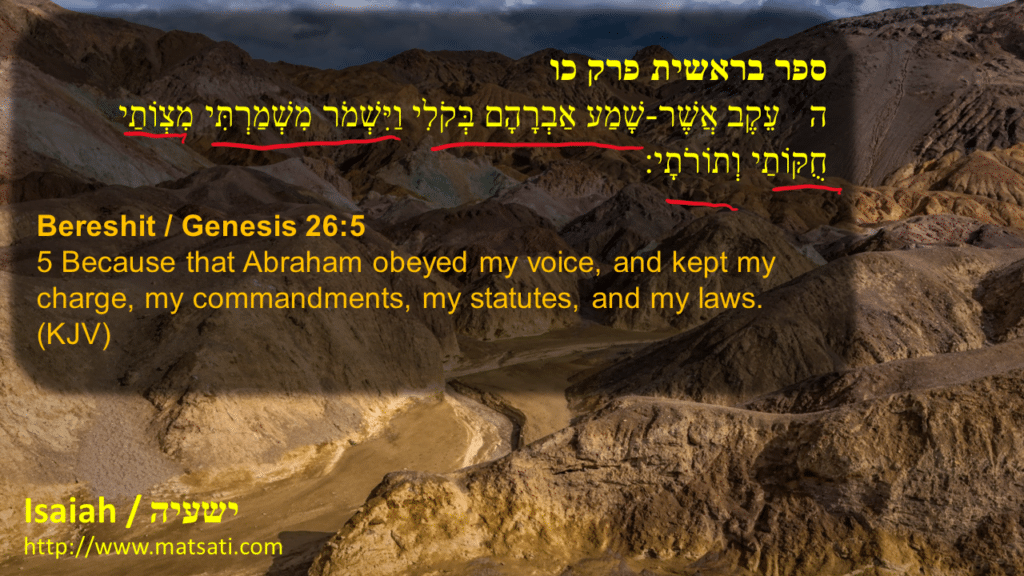
ספר בראשית פרק כו
ה עֵקֶב אֲשֶׁר-שָׁמַע אַבְרָהָם בְּקֹלִי וַיִּשְׁמֹר מִשְׁמַרְתִּי מִצְוֹתַי חֻקּוֹתַי וְתוֹרֹתָי:
Bereshit / Genesis 26:5
5 Because that Abraham obeyed my voice, and kept my charge, my commandments, my statutes, and my laws. (KJV)
Here we are told how Abraham obeyed the voice of God; He kept מִשְׁמַרְתִּי מִצְוֹתַי חֻקּוֹתַי וְתוֹרֹתָי “my charge, my mitzvot, my statutes, and my Torah.” Interesting how we are not told when God had given Abraham His Torah, but yet all of these things are said of Abraham because of his faith. The idea here is to חּוֹרה and חֹק are distinguished by saying that this refers to those laws which society would make without the need for a specific revelation from God. This is what we naturally know as right and wrong, such as the moral and ethical standards that are taught in the Scriptures. This is how Isaiah’s text is to be understood. Ibn Ezra appears to focus upon circumcision in reference to Torah (חּוֹרה). His point is that the laws of God, contained in the natural order of things, is the meaning behind the ברית עולם, the everlasting covenant. This is how the Apostle Paul understood these things when we read Romans 2:1-16.
Romans 2:12-16
2:12 For as many as have sinned without law shall also perish without law: and as many as have sinned in the law shall be judged by the law; 2:13 (For not the hearers of the law are just before God, but the doers of the law shall be justified. 2:14 For when the Gentiles, which have not the law, do by nature the things contained in the law, these, having not the law, are a law unto themselves: 2:15 Which shew the work of the law written in their hearts, their conscience also bearing witness, and their thoughts the mean while accusing or else excusing one another;) 2:16 In the day when God shall judge the secrets of men by Jesus Christ according to my gospel. (KJV, ܐܱܝܠܷܝܢ ܓܷ݁ܝܪ ܕܱ݁ܕ݂ܠܴܐ ܢܳܡܽܘܣܳܐ ܚܛܱܘ ܆ ܐܴܦ݂ ܕ݁ܠܴܐ ܢܳܡܽܘܣܳܐ ܢܺܐܒ݂ܕܾ݁ܘܢ ܂ ܘܰܐܝܠܷܝܢ ܕܱ݁ܒ݂ܢܳܡܽܘܣܳܐ ܚܛܱܘ ܆ ܡܶܢ ܢܳܡܽܘܣܳܐ ܢܶܬ݁ܕ݂ܺܝܢܽܘܢ ܂ܠܴܐ ܗ̄ܘܳܐ ܓܷ݁ܝܪ ܫܳܡܽܘܥܰܘܗ̄ܝ̈ ܕ݁ܢܳܡܽܘܣܳܐ ܟܻ݁ܐܢܺܝܢ ܩܕ݂ܳܡ ܐܱܠܴܗܳܐ ܆ ܐܷܠܴܐ ܥܳܒ݂ܽܘܕ݂ܰܘܗ̄ܝ̈ ܕ݁ܢܳܡܽܘܣܳܐ ܡܶܙܕܱ݁ܕ݁ܩܺܝܢ ܂ ܐܷܢ ܓܷ݁ܝܪ ܥܰܡ̄ܡܷ̈ܐ ܕ݁ܢܳܡܽܘܣܳܐ ܠܱܝܬ݁ ܠܗܽܘܢ ܇ ܡܶܢ ܟ݁ܝܳܢܗܽܘܢ ܢܶܥܒ݁ܕ݂ܽܘܢ ܕ݁ܢܳܡܽܘܣܳܐ ܆ ܗܳܢܽܘܢ ܕ݁ܟ݂ܰܕ݂ ܢܳܡܽܘܣܳܐ ܠܱܝܬ݁ ܗ̄ܘܳܐ ܠܗܽܘܢ ܆ ܠܢܰܦ݂ܫܗܽܘܢ ܗܘܰܘ ܢܳܡܽܘܣܳܐ ܂ ܘܗܶܢܽܘܢ ܡܚܰܘܶܝܢ ܥܒ݂ܳܕ݂ܶܗ ܕ݁ܢܳܡܽܘܣܳܐ ܂ ܟܱ݁ܕ݂ ܟ݁ܬ݂ܻܝܒ݂ ܥܰܠ ܠܷܒ݁ܗܽܘܢ ܂ ܘܡܰܣܗܕ݂ܳܐ ܥܠܱܝܗܽܘܢ ܬܻ݁ܐܪܬ݁ܗܽܘܢ ܂ ܟܱ݁ܕ݂ ܡܰܚܫܒ݂ܳܬ݂ܗܽܘܢ̈ ܡܟ݂ܰܘܢܴ̈ܢ ܂ ܐܱܘ ܢܳܦ݂ܩܳܢ̈ ܪܾܘܚܳܐ ܂ ܠܱܚ̈ܕ݂ܳܕ݂ܶܐ ܇ ܒ݁ܝܰܘܡܳܐ ܕ݁ܕ݂ܳܐܷܢ ܐܱܠܴܗܳܐ ܟܱ݁ܣܝܴ̈ܬ݂ܴܐ ܕܱ݁ܒ݂ܢܰܝ̈ܢܳܫܳܐ ܇ ܐܱܝܟ݂ ܐܷܘܰܢܓܷ݁ܠܻܝܳܘܢ ܕܻ݁ܝܠܝ ܒ݁ܝܰܕ݂ ܝܶܫܽܘܥ ܡܫܺܝܚܳܐ 12 Ὅσοι γὰρ ἀνόμως ἥμαρτον, ἀνόμως καὶ ἀπολοῦνται· καὶ ὅσοι ἐν νόμῳ ἥμαρτον, διὰ νόμου κριθήσονται· 13 οὐ γὰρ οἱ ἀκροαταὶ νόμου δίκαιοι παρὰ τῷ θεῷ, ἀλλʼ οἱ ποιηταὶ νόμου δικαιωθήσονται. 14 ὅταν γὰρ ἔθνη τὰ μὴ νόμον ἔχοντα φύσει τὰ τοῦ νόμου ποιῶσιν, οὗτοι νόμον μὴ ἔχοντες ἑαυτοῖς εἰσὶν νόμος, 15 οἵτινες ἐνδείκνυνται τὸ ἔργον τοῦ νόμου γραπτὸν ἐν ταῖς καρδίαις αὐτῶν συνμαρτυρούσης αὐτῶν τῆς συνειδήσεως καὶ μεταξὺ ἀλλήλων τῶν λογισμῶν κατηγορούντων ἢ καὶ ἀπολογουμένων, 16 ἐν ἡμέρᾳ ὅτε κρινεῖ ὁ θεὸς τὰ κρυπτὰ τῶν ἀνθρώπων κατὰ τὸ εὐαγγέλιόν μου διὰ Ἰησοῦ χριστοῦ.)
Paul states οἵτινες ἐνδείκνυνται τὸ ἔργον τοῦ νόμου γραπτὸν ἐν ταῖς καρδίαις αὐτῶν “gentiles demonstrate the law in their hearts.” This is exactly what Ibn Ezra is saying, “the laws of God, contained in the natural order of things, is the meaning behind the ברית עולם, the everlasting covenant.” Note that it is possible to go through all of the writings of Paul and he is consistent with the rabbinic opinion on these things! The point is that Paul is difficult to understand, just as the rabbis in the rabbinic literature are difficult to understand at times. Paul is arguing that those who do not know the Torah, they are not exempt from the Torah requirements before God. This is why in Romans 2:16 he writes κρινεῖ ὁ θεὸς τὰ κρυπτὰ τῶν ἀνθρώπων “God will judge the secrets of man.” The κρυπτὰ (secrets) we realize how sin is hidden so nobody finds it out, but The Lord God sees from above. There is no escaping His eyes which see all. This is how Isaiah is explaining to us in the judgment of the nations, that all people of the earth are responsible for what God has given in our hearts, for righteousness and truth, with or without the Torah of God.
Isaiah goes on saying, ו עַל כֵין מִן קֳדָם מֹומֵי דְשקַר חְרֹובַת אַרעָא וְצַדִיאוּ דְיָתְבִין בַה עַל כֵין סָפוּ יָתְבֵי אַרעָא וְאִשתְאַר אְנָשָא כִזעֵיר׃ 24:6 Because of perjury the land hath become a desert, and all the inhabitants in it are laid desolate: therefore are the inhabitants of the land destroyed, and the men that are left are but few. ז אִתאַבַלוּ כָל שָתֵי חְמַר אְרֵי אִתפְרִיכוּ גוּפנַיָא אִתאְנַחוּ כָל חָדֵי לִיבָא׃ 24:7 All that drink wine mourn, because the vines are broken down, all the merry-hearted sigh. ח בְטֵילַת חַדוַת תוּפִין אִתמְנַעַת אִתרְגֹושַת תַקִיפִין פְסַקַת חַדוַת כִינָרָא׃ 24:8 The mirth of tabrets ceaseth; the tumultuous assembly of the mighty is restrained, the joy of the harp ceaseth. (TgJ) Here Isaiah speaks of the cessation of all joy and merriment around the world. The Talmud writes the following concerning these verses.
Talmud Bavli Gittin 7a:9
וְלִישְׁלַח לְהוּ מֵהָכָא בַּשִּׁיר לֹא יִשְׁתּוּ יָיִן יֵמַר שֵׁכָר לְשׁוֹתָיו אִי מֵהָהוּא הֲוָה אָמֵינָא הָנֵי מִילֵּי זִמְרָא דְמָנָא אֲבָל דְּפוּמָּא שְׁרֵי קָא מַשְׁמַע לַן The Gemara asks: And let him send them a response from here: “They do not drink wine with a song; strong drink is bitter to them who drink it” (Isaiah 24:9), indicating that song is no longer allowed. The Gemara answers: If he had answered by citing that verse, I would say that this matter applies only to instrumental music, in accordance with the previous verse: “The mirth of tabrets ceases, the noise of them who rejoice ends, the joy of the harp ceases” (Isaiah 24:8); however, vocal song is permitted. Therefore, Mar Ukva teaches us that all types of song are forbidden.
According to the Talmud, wine brings joy and merriment. In this situation however, the strong drink is bitter to those who drink it. Remember Isaiah wrote according to Isaiah 5:11 “Woe unto them that rise up early in the morning, that they may follow strong drink; That tarry late into the night, till wine inflame them!” and Isaiah 5:22 “Woe unto them that are mighty to drink wine, and men of strength to mingle strong drink.” The world considers it a prize to be powerful in drink. The Talmud Bavli quotes from Mishley / Proverbs 20:1 in Gittin 68a:11 “He said that it is written: ‘Wine is a mocker, strong drink is riotous; and whosoever wallows in it is not wise,’ and it is written: ‘Harlotry, wine, and new wine take away the heart.’” We also note that the Torah states the Cohanim (Priests) were not to drink and enter into the Tabernacle or they would die. (i.e. Nadav and Avihu in Vayikra / Leviticus 10:1-10) The point for the Cohanim was to take the service of God seriously. Alcohol has the effect of making the heart merry, meaning full of jesting, boastful speech, and a loose tongue to say things one shouldn’t, all of which modifies behavior before God, and so one is not to go before the Holy God in this way. Today in the Messiah Yeshua, we are given the presence of God in our midst, inside of us. This draws in a very important point, we no matter what we are doing, are always standing in the presence of God if His Holy Spirit is indwelling us. This raises the standard of living to a priestly level. Again, this draws in the Torah perspective from Vayikra / Leviticus 19:2 דַּבֵּ֞ר אֶל־aכָּל־עֲדַ֧תa בְּנֵי־יִשְׂרָאֵ֛ל וְאָמַרְתָּ֥ אֲלֵהֶ֖ם קְדֹשִׁ֣ים תִּהְי֑וּ כִּ֣י קָדֹ֔ושׁ אֲנִ֖י יְהוָ֥ה אֱלֹהֵיכֶֽם “You shall be holy, for I the Lord your God am holy.” This idea of “Holiness” is to set apart, to sanctify one’s life for the Lord. In the Torah we are called to become aware of the sacredness and calling of God, we are to open our eyes to the Divine presence of God. The idea of holiness in this world, living this out can become difficult due to the influences of the world. Our thinking should be one of recognizing the holiness of God and what the Lord expects of us, and then having a sense of Teshuvah (Repentance) every day, to turn our hearts back to the truth, to the Word of the Living God, and put away negativity and unholiness. We are called to embrace the presence of God in our lives each day and recognize how the Lord God provided a remedy and hope of salvation in Yeshua our Savior. Because of His great love for us, the Lord God Almighty makes us who are unclean, common, and profane, and elevates us to a place of being sacred and beloved. Consequently, we are called to walk in that sanctification, remembering this spiritual truth, to be Torah Aware of our actions, and then take every thought captive to the truth of the Messiah Yeshua. And the presence of God in our lives will help us walk in that calling of holiness by the power of His presence because of his unfailing love and grace in the Messiah!
